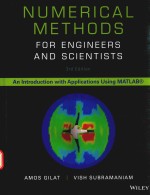图书介绍
NUMERICAL METHODS FOR ENGINEERS AND SCIENTISTS AN INTRODUCTION WITH APPLICATIONS USING MATLABPDF|Epub|txt|kindle电子书版本网盘下载

- AMOS GILAT 著
- 出版社: WILEY
- ISBN:9781118554937
- 出版时间:2014
- 标注页数:559页
- 文件大小:93MB
- 文件页数:574页
- 主题词:
PDF下载
下载说明
NUMERICAL METHODS FOR ENGINEERS AND SCIENTISTS AN INTRODUCTION WITH APPLICATIONS USING MATLABPDF格式电子书版下载
下载的文件为RAR压缩包。需要使用解压软件进行解压得到PDF格式图书。建议使用BT下载工具Free Download Manager进行下载,简称FDM(免费,没有广告,支持多平台)。本站资源全部打包为BT种子。所以需要使用专业的BT下载软件进行下载。如BitComet qBittorrent uTorrent等BT下载工具。迅雷目前由于本站不是热门资源。不推荐使用!后期资源热门了。安装了迅雷也可以迅雷进行下载!
(文件页数 要大于 标注页数,上中下等多册电子书除外)
注意:本站所有压缩包均有解压码: 点击下载压缩包解压工具
图书目录
Chapter 1 Introduction1
1.1 Background1
1.2 Representation of Numbers on a Computer4
1.3 Errors in Numerical Solutions10
1.3.1 Round-Off Errors10
1.3.2 Truncation Errors13
1.3.3 Total Error14
1.4 Computers and Programming15
1.5 Problems18
Chapter 2 Mathematical Background23
2.1 Background23
2.2 Concepts from Pre-Calculus and Calculus24
2.3 Vectors28
2.3.1 Operations with Vectors30
2.4 Matrices and Linear Algebra32
2.4.1 Operations with Matrices33
2.4.2 Special Matrices35
2.4.3 Inverse of a Matrix36
2.4.4 Properties of Matrices37
2.4.5 Determinant of a Matrix37
2.4.6 Cramers Rule and Solution of a System of Simultaneous Linear Equations38
2.4.7 Norms40
2.5 Ordinary Differential Equations (ODE)41
2.6 Functions of Two or More Independent Variables44
2.6.1 Definition of the Partial Derivative44
2.6.2 Chain Rule45
2.6.3 The Jacobian46
2.7 Taylor Series Expansion of Functions47
2.7.1 Taylor Series for a Function of One Variable47
2.7.2 Taylor Series for a Function of Two Variables49
2.8 Inner Product and Orthogonality50
2.9 Problems51
7.5 The Discrete Fourier Series and Discrete Fourier Transform263
7.6 Complex Discrete Fourier Transform268
7.7 Power (Energy) Spectrum271
7.8 Aliasing and Nyquist Frequency272
7.9 Alternative Forms of the Discrete Fourier Transform278
7.10 Use of MATLAB Built-In Functions for Calculating Discrete Fourier Transform278
7.11 Leakage and Windowing284
7.12 Bandwidth and Filters286
7.13 The Fast Fourier Transform (FFT)289
7.14 Problems298
Chapter 8 Numerical Differentiation303
8.1 Background303
8.2 Finite Difference Approximation of the Derivative305
8.3 Finite Difference Formulas Using Taylor Series Expansion310
8.3.1 Finite Difference Formulas of First Derivative310
8.3.2 Finite Difference Formulas for the Second Derivative315
8.4 Summary of Finite Difference Formulas for Numerical Differentiation317
8.5 Differentiation Formulas Using Lagrange Polynomials319
8.6 Differentiation Using Curve Fitting320
8.7 Use of MATLAB Built-In Functions for Numerical Differentiation320
8.8 Richardson’s Extrapolation322
8.9 Error in Numerical Differentiation325
8.10 Numerical Partial Differentiation327
8.11 Problems330
Chapter 9 Numerical Integration341
9.1 Background341
9.1.1 Overview ofApproaches in Numerical Integration342
9.2 Rectangle and Midpoint Methods344
9.3 Trapezoidal Method346
9.3.1 Composite Trapezoidal Method347
9.4 Simpson’s Methods350
9.4.1 Simpsons 1/3 Method350
9.4.2 Simpsons 3/8 Method353
9.5 Gauss Quadrature355
9.6 Evaluation of Multiple Integrals360
9.7 Use of MATLAB Built-In Functions for Integration362
9.8 Estimation of Error in Numerical Integration364
9.9 Richardson’s Extrapolation366
9.10 Romberg Integration369
9.11 Improper Integrals372
9.11.1 Integrals with Singularities372
9.11.2 Integrals with Unbounded Limits373
9.12 Problems374
Chapter 10 Ordinary Differential Equations:Initial-Value Problems385
10.1 Background385
10.2 Euler’s Methods390
10.2.1 Euler’s Explicit Method390
10.2.2 Analysis of Truncation Error in Euler’s Explicit Method394
10.2.3 Eulers Implicit Method398
10.3 Modified Euler’s Method401
10.4 Midpoint Method404
10.5 Runge-Kutta Methods405
10.5.1 Second-Order Runge-Kutta Methods406
10.5.2 Third-Order Runge-Kutta Methods410
10.5.3 Fourth-Order Runge-Kutta Methods411
10.6 Multistep Methods417
10.6.1 Adams-Bashforth Method418
10.6.2 Adams-Moulton Method419
10.7 Predictor-Corrector Methods420
10.8 System of First-Order Ordinary Differential Equations422
10.8.1 Solving a System ofFirst-Order ODEs Using Eulers Explicit Method424
10.8.2 Solving a System of First-Order ODEs Using Second-Order Runge-Kutta Method (Modified Euler Version)424
10.8.3 Solving a System ofFirst-Order ODEs Using the Classical Fourth-Order Runge-Kutta Method431
10.9 Solving a Higher-Order Initial Value Problem432
10.10 Use of MATLAB Built-In Functions for Solving Initial-Value Problems437
10.10.1 Solving a Single First-Order ODE Using MATLAB438
10.10.2 Solving a System of First-Order ODEs Using MATLAB444
10.11 Local Truncation Error in Second-Order Range-Kutta Method447
10.12 Step Size for Desired Accuracy448
10.13 Stability452
10.14 Stiff Ordinary Differential Equations454
10.15 Problems457
Chapter 11 Ordinary Differential Equations:Boundary-Value Problems471
11.1 Background471
11.2 The Shooting Method474
11.3 Finite Difference Method482
11.4 Use of MATLAB Built-In Functions for Solving Boundary Value Problems492
11.5 Error and Stability in Numerical Solution of Boundary Value Problems497
11.6 Problems499
Appendix A Introductory MA TLAB509
A.1 Background509
A.2 Starting with MATLAB509
A.3 Arrays514
A.4 Mathematical Operations with Arrays519
A.5 Script Files524
A.6 Plotting526
A.7 User-Defined Functions and Function Files528
A.8 Anonymous Functions530
A.9 Function functions532
A.10 Subfunctions535
A.11 Programming in MATLAB537
A.11.1 Relational and Logical Operators537
A.11.2 Conditional Statements,if-else Structures538
A.11.3 Loops541
A.12 Problems542
Appendix B MATLAB Programs547
Appendix C Derivation of the Real Discrete Fourier Transform(DFT)551
C.1 Orthogonality of Sines and Cosines for Discrete Points551
C.2 Determination of the Real DFT553
Index555